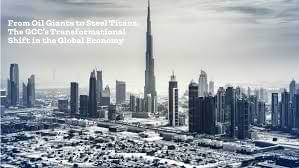
UAE Steel Industry: Strengthening the Nation’s Infrastructure and Economy
The United Arab Emirates (UAE) has emerged as one of the leading steel producers in the Middle East, playing a pivotal role in supporting the country’s infrastructure development, industrial growth, and economic diversification. With massive investments in urban development, energy projects, and logistics infrastructure, steel has become an indispensable component of the UAE’s transformation into a modern industrial hub. This article explores the evolution of the UAE steel industry, its key players, current challenges, and future prospects.
The UAE steel industry has grown rapidly over the past two decades, in line with the country’s ambitious infrastructure projects and national visions such as UAE Vision 2030 and Operation 300bn, which aim to position the UAE as a global industrial powerhouse. Steel is critical in the construction of buildings, bridges, airports, oil rigs, pipelines, and transportation networks—all of which are integral to the nation’s expansion.
From the towering skyline of Dubai to the industrial zones of Abu Dhabi, steel has literally built the UAE. Its durability, strength, and cost-effectiveness make it the material of choice in nearly every major development project.
The UAE is home to some of the largest and most technologically advanced steel producers in the region. These companies not only meet domestic demand but also export to over 50 countries, enhancing the UAE’s position as a global steel supplier.
Based in Abu Dhabi and part of the ADQ holding group, Emirates Steel Arkan is the leading integrated steel manufacturer in the UAE. It produces a wide range of long and flat steel products used in construction, oil and gas, and manufacturing sectors. ESA was the first steelmaker in the region to be verified by the Climate Bonds Initiative for sustainable production, highlighting its commitment to green manufacturing.
Located in the Hamriyah Free Zone and Jebel Ali respectively, these companies contribute significantly to the UAE’s rebar and structural steel output. Conares, for example, is the second-largest private steel producer in the country and a major exporter to GCC markets.
These companies play important roles in supplying steel products for construction and industrial fabrication. Al Ghurair is also known for its cold rolling mill, which produces galvanized steel sheets used in appliances, HVAC, and automotive industries.
UAE steel manufacturers offer a wide variety of products to meet the needs of different sectors:
Rebars and wire rods – Used in reinforced concrete construction.
Structural steel – Beams, angles, and channels for large-scale structures.
Flat products – Hot-rolled coils, cold-rolled coils, and galvanized sheets for industrial applications.
Pipes and tubes – Used in oil and gas pipelines, water systems, and mechanical applications.
Pre-painted steel – Popular in roofing, cladding, and appliance manufacturing.
In recent years, the UAE steel industry has made substantial progress toward sustainable production. With growing global and regional emphasis on climate action, manufacturers are integrating cleaner technologies, reducing carbon emissions, and improving energy efficiency.
For example, Emirates Steel Arkan has adopted electric arc furnace (EAF) technology, which emits less CO₂ than traditional blast furnaces. The company also recycles scrap steel, contributing to the UAE’s circular economy goals. Additionally, there is increasing interest in hydrogen-based steelmaking, which could drastically reduce emissions in the future.
Despite its strengths, the UAE steel sector faces several challenges:
Global Market Volatility: Steel prices fluctuate due to global demand, trade policies, and raw material costs. This unpredictability affects profitability and long-term planning.
Overcapacity in the Region: The Middle East has more steel production capacity than demand, leading to stiff competition and pressure on margins.
Decarbonization Pressures: As international regulations tighten, steelmakers must invest in cleaner processes, which requires significant capital.
Supply Chain Disruptions: Geopolitical tensions, shipping delays, and raw material shortages have added operational complexity since the COVID-19 pandemic.
The UAE government supports the steel industry as a key component of its industrial strategy. Initiatives such as the Make it in the Emirates campaign and Operation 300bn aim to boost local manufacturing, reduce import dependence, and increase exports.
Moreover, through partnerships with international technology providers and investments in research and development, the UAE is positioning itself as a forward-thinking player in the global steel market.
The future of the UAE steel industry looks promising. Demand is expected to remain strong, fueled by upcoming mega-projects such as Etihad Rail, the Abu Dhabi Industrial Strategy, the Dubai Urban Master Plan 2040, and increased investments in green energy and logistics.
Technological innovation, digital transformation, and sustainability will be key drivers of competitiveness in the coming years. Companies that invest in automation, smart factories, and low-carbon processes will be best positioned to lead the next phase of growth.
| Categories: | Items for Sale / Tools |
| Phone: | +86 135 7205 0608 |
| Address: | Building 1, No. 5218, Yunchuan Road, Baoshan District, Shanghai, China |
| Website: | View our site |
| Email: | order@midweststeelsupply.org |